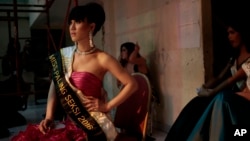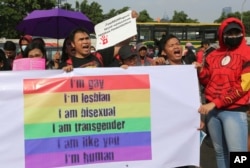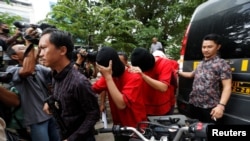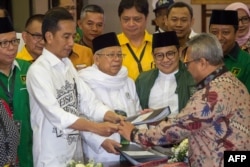Majority-Hindu Bali has long been considered more tolerant of different sexual identities compared with other parts of Indonesia, especially amid recent anti-LGBT (lesbian, gay, bisexual and transgender) crackdowns in the world’s largest Muslim-majority country.
But a beauty pageant promoting HIV education and equality was this month shutdown by Islamic hardliners, sparking concern among some in the LGBT community that Bali is no longer a safe place.
Organized by the Bali-based Gaya Dewata Foundation, which provides testing, counseling and support on HIV and other sexually transmitted diseases, the pageant has been held annually for the past three years. But this year, anti-LGBT Muslim groups reportedly harassed the owners of the Bhumiku Convention Hall in Denpasar, Bali’s capital.
“We had to call off our event, due to the owners of the venue canceling it,” Christian Supriyadinata, the director of Gaya Dewata, told VOA.
“I thought Bali will have that space for us to be ourselves,” said Agung a Balinese native who recently moved back to the island from Muslim-majority Java. He chose to be identified by one name to protect his identity. Agung told VOA it, “actually turns out to be Bali doesn’t have that immunity anymore, doesn’t have that bubble anymore to protect ourselves.”
LGBT events canceled
Lini Zurlia, an Indonesian queer activist who works for the regional LGBT organization ASEAN SOGIE Caucus, said this was not first LGBT event to be canceled in Bali. Many public events for the Straits Games, a sports event for the gay community from across Asia, were canceled last year after pressure from certain quarters, she said.
“It was not only from hard-line groups but also from the police,” she said. “Since then, we think Bali isn’t all that friendly [to LGBT people] after all. Maybe it’s just friendly because it’s a center for tourism in Indonesia.”
The local chapter of the Indonesian Council of Ulama (MUI) was among the groups that opposed the event and reported it to the police.
“This is clearly very alarming, because the [pageant] is clearly contrary to moral and religious values in Indonesia,” the Bali MUI chairman, Muhammad Taufik Asadi, told the conservative-leaning newspaper Republika.
Sexuality and health
Many local cultures in Indonesia have traditionally had fluid understandings of sexuality beyond a binary of heterosexuality and homosexuality. This has, however, eroded in recent years with the rise of more conservative strains of Islam. Intensified anti-LGBT sentiment has also been accompanied by rising infection rates of HIV/AIDS.
According to UNAIDS, Indonesia had 48,000 new HIV infections and 38,000 AIDS-related deaths in 2016, an increase in AIDS-related deaths of 68 percent from 2010.
“We want the community in Bali, especially our friends in the LGBT community, to understand the problem of HIV/AIDS and help with HIV/AIDS prevention,” Supriyadinata said.
Members of the LGBT community are disproportionately affected, with HIV prevalence rates of 25.8 percent for men who have sex with men and 24.8 percent of transgender people.
“Cases of HIV/AIDS across the whole community [in Indonesia] have indeed increased, so information about HIV/AIDS is much needed,” Supriyadinata said.
Moral panic
The Gaya Dewata pageant’s cancellation is just the latest in a string of anti-LGBT actions by the police and civil society groups across Indonesia. While gay sex is not a crime, the LGBT community is often targeted under the country’s strict anti-pornography laws.
Earlier this month, Jakarta police raided a so-called “gay party” and arrested four men on drug charges. Law enforcement publicly paraded the suspects and their faces were televised. Several social media accounts later further spread the men’s images to shame them.
Social media again exploded with the hashtag #UninstallGojek, with many netizens calling for a boycott of the local ride-sharing application Gojek after one of the company’s executives expressed support for diversity and tolerance of LGBT people on Facebook.
Indonesia’s minister for religion, Lukman Saifuddin, subsequently released a video on social media declaring that “all religions reject LGBT, that’s why I reject LGBT actions and behavior.”
“Although LGBT behavior is wrong, they should be treated with empathy so that they change their deviant ways,” he added. Survey results released by Saiful Mujani Research & Consulting in January showed that 81.5 percent of Indonesians believe gay and lesbian “behavior” is prohibited by religion, and a majority said they would object to having LGBT neighbors or in government. But only 58.3 percent of the respondents reported to know what LGBT meant.
Election season
Some worry that anti-LGBT activity will further ramp up ahead of the country’s presidential elections in April 2019. The incumbent Joko Widodo’s running mate, the influential conservative cleric Ma’ruf Amin, has helped issue fatwas against LGBT people as a member of Indonesia’s Ulama Council.
“We want a stern prohibition of LGBT activities and other deviant sexual activities and legislation that categorizes them as crime[s],” he was quoted as saying by the national news agency Antara in 2016.
Anti-LGBT themes also feature heavily in the rhetoric of supporters of opposition candidate Prabowo Subianto. According to Zurlia of ASEAN SOGIE Caucus, many of the Islamic groups who support Prabowo and opposition figure Fadli Zon claim that the LGBT movement is the product of Western influence and an import from countries like the United States.
“They’re good friends with the American president and praise Donald Trump and yet say that the LGBT movement comes from America,” she said. “It doesn’t make any sense.”







